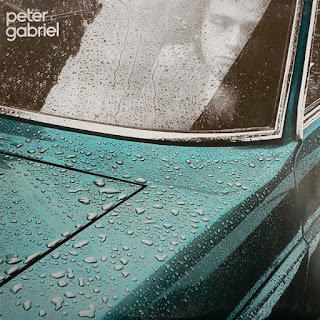Peter Gabriel: Peter Gabriel I [Car] (1977)
Following his 1975 departure from Genesis, Peter Gabriel embarked on a remarkable run of solo albums which managed to sound not only little like Genesis, but little like one another, each representing a bold stylistic departure from its predecessor. (Gabriel also declined to name any of these albums, though the record company insisted on labeling the fourth one Security for US markets.)
Personally, I find his debut, which goes either by Peter Gabriel or its cover-photo inspired nickname Car, to be the most inconsistent of the bunch, owing in part to a few sprawling, bombastic, proggy tracks and the at times over-the-top production of Bob Ezrin (also known for Lou Reed's Berlin and Pink Floyd's The Wall -- so, yeah, a guy who knows his bombast).
Still, the album's peaks are so high, and it represents such a gutsy departure from Genesis, that I can't help but love the album quite a bit.
"Solsbury Hill" is the killer single, one of those rare songs that sounds fresh and gorgeous every single time, that loses none of its ability to stir me no many how many times I listen. It's based around a simple, repeated acoustic guitar riff with some gentle keyboards, all focus on the lyrics, an allegory of finding independence and walking "out of the machinery" (and presumably an explanation of walking away from Genesis at the then-height of their success). The triumphant close is pure joy, as the electric guitar bursts forth for the first time.
"Today I don't need a replacement, I'll tell them what the smile on my face meant
My heart going boom, boom, boom
Hey, I said, you can keep my things, they've come to take me home."
Another favorite is the closing epic "Here Comes The Flood," a gorgeous post-apocryphal ballad with a gut-wrenching chorus. Robert Fripp, who plays guitar on the album and produced the follow-up record, includes an alternate recording on his Exposure album, just Gabriel's vocals and hushed piano augmented by Fripp's guitar loops, and that version is no doubt more striking and intense; but while Ezrin's excessive orchestration on the Peter Gabriel version arguably hinders the song's majesty, I still think it's pretty damn stunning.
Elsewhere you've got the surprisingly straightforward pop-rock of "Modern Love," with a crunchy guitar riff; the eerie and captivating "Moribund the Burgermeister," with Gabriel's colorful character-driven vocal affectations making the song the closest he comes to sounding like he did in the Genesis days; and the entracing "Humdrum," which starts as a gentle ballad before opening into a more complex densely-packed track. The remaining tracks are interesting and highly varied stylistically, though plagued a bit by Ezrin's overkill production and instrumentation (not that aren't moments of magic to be found even in sprawling tracks like "Down the Dolce Vita").
Here's the "Solsbury Hill" video:
Here's an absolutely stunning solo piano version of "Here Comes The Flood," taken from a Kate Bush tv Christmas special:
And a live (and totally whacked-out) take on "Moribund the Burgermeister":
Personally, I find his debut, which goes either by Peter Gabriel or its cover-photo inspired nickname Car, to be the most inconsistent of the bunch, owing in part to a few sprawling, bombastic, proggy tracks and the at times over-the-top production of Bob Ezrin (also known for Lou Reed's Berlin and Pink Floyd's The Wall -- so, yeah, a guy who knows his bombast).
Still, the album's peaks are so high, and it represents such a gutsy departure from Genesis, that I can't help but love the album quite a bit.
"Solsbury Hill" is the killer single, one of those rare songs that sounds fresh and gorgeous every single time, that loses none of its ability to stir me no many how many times I listen. It's based around a simple, repeated acoustic guitar riff with some gentle keyboards, all focus on the lyrics, an allegory of finding independence and walking "out of the machinery" (and presumably an explanation of walking away from Genesis at the then-height of their success). The triumphant close is pure joy, as the electric guitar bursts forth for the first time.
"Today I don't need a replacement, I'll tell them what the smile on my face meant
My heart going boom, boom, boom
Hey, I said, you can keep my things, they've come to take me home."
Another favorite is the closing epic "Here Comes The Flood," a gorgeous post-apocryphal ballad with a gut-wrenching chorus. Robert Fripp, who plays guitar on the album and produced the follow-up record, includes an alternate recording on his Exposure album, just Gabriel's vocals and hushed piano augmented by Fripp's guitar loops, and that version is no doubt more striking and intense; but while Ezrin's excessive orchestration on the Peter Gabriel version arguably hinders the song's majesty, I still think it's pretty damn stunning.
Elsewhere you've got the surprisingly straightforward pop-rock of "Modern Love," with a crunchy guitar riff; the eerie and captivating "Moribund the Burgermeister," with Gabriel's colorful character-driven vocal affectations making the song the closest he comes to sounding like he did in the Genesis days; and the entracing "Humdrum," which starts as a gentle ballad before opening into a more complex densely-packed track. The remaining tracks are interesting and highly varied stylistically, though plagued a bit by Ezrin's overkill production and instrumentation (not that aren't moments of magic to be found even in sprawling tracks like "Down the Dolce Vita").
Here's the "Solsbury Hill" video:

Comments
Post a Comment